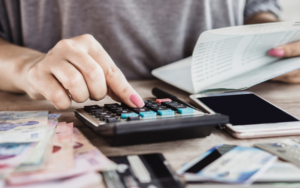
1. Set financial goals
Setting financial goals - particularly small, achievable financial goals - can help you to achieve what you want more easily. For example, if your ultimate goal is to buy a property, then you could set small financial goals related to this, such as clearing a credit card that you've had for a while, or saving up for the deposit. You could even break down these goals even further, so - if you're saving for a deposit - you could divide that into small increments by starting to budget.
2. Budget
There are a host of handy tools and websites that can help you to budget, including apps that you can have on your phone - such as the apps Emma*, Moneyhub* or Snoop* - which can help you whether you are new to budgeting or just to have a look at where exactly your money is going each month. You may find our article 'The best budgeting apps in the UK' useful. We also have a free budget planner that can help you to budget your money if you prefer to use a spreadsheet. You should be checking your bank accounts regularly already, but also try to have a look to see precisely where the money leaving your account is going, particularly if you have a lot of direct debits and standing orders. You could potentially be paying for something that you don't realise you had signed up for and you could easily save yourself money by cancelling some of those subscriptions.
3. Pay yourself first
Paying yourself first means setting up a payment to yourself as soon as you get paid and treating it as a bill. The idea is at the end of the month that money can be used toward clearing debt or if you are in the lucky position of not having any debt you can use it towards savings or investments. By paying yourself first, you will avoid spending this money during the month and it will help you achieve your financial goals.
4. Are you protected?
You should be checking if you are suitably protected. Do you have the right insurance policies in place now? Some insurance policies may not be relevant to everyone, but for example, if you do have a house or you've recently started a family, do you have a life insurance policy in place to protect you and your family in the event of your death? There are other important personal finance products out there to consider, such as income protection insurance, which can help you if you are unable to work due to illness or injury. We have a host of articles about the different types of personal insurance - such as life, income protection, and health - so be sure to go and check them out to work out if you need to get any.
5. Take Damien's Money MOT
This is the quickest and easiest way to get on top of your finances and develop an understanding of which areas of your finances you need to focus on first. Head over to Damien’s Money MOT, where it takes just two minutes to answer a few questions about your personal finances. You’ll receive a grade telling you if your finances are in good working order, and highlighted areas that you may need to improve on. You can then take it one step further by signing up for Damien's free Action Plan, which will show you how to take the next steps to be able to improve those areas.
If a link has an * beside it this means that it is an affiliated link. If you go via the link Money to the Masses may receive a small fee which helps keep Money to the Masses free to use. The following link can be used if you do not wish to help Money to the Masses or take advantage of any exclusive offers - Snoop, Moneyhub, Emma